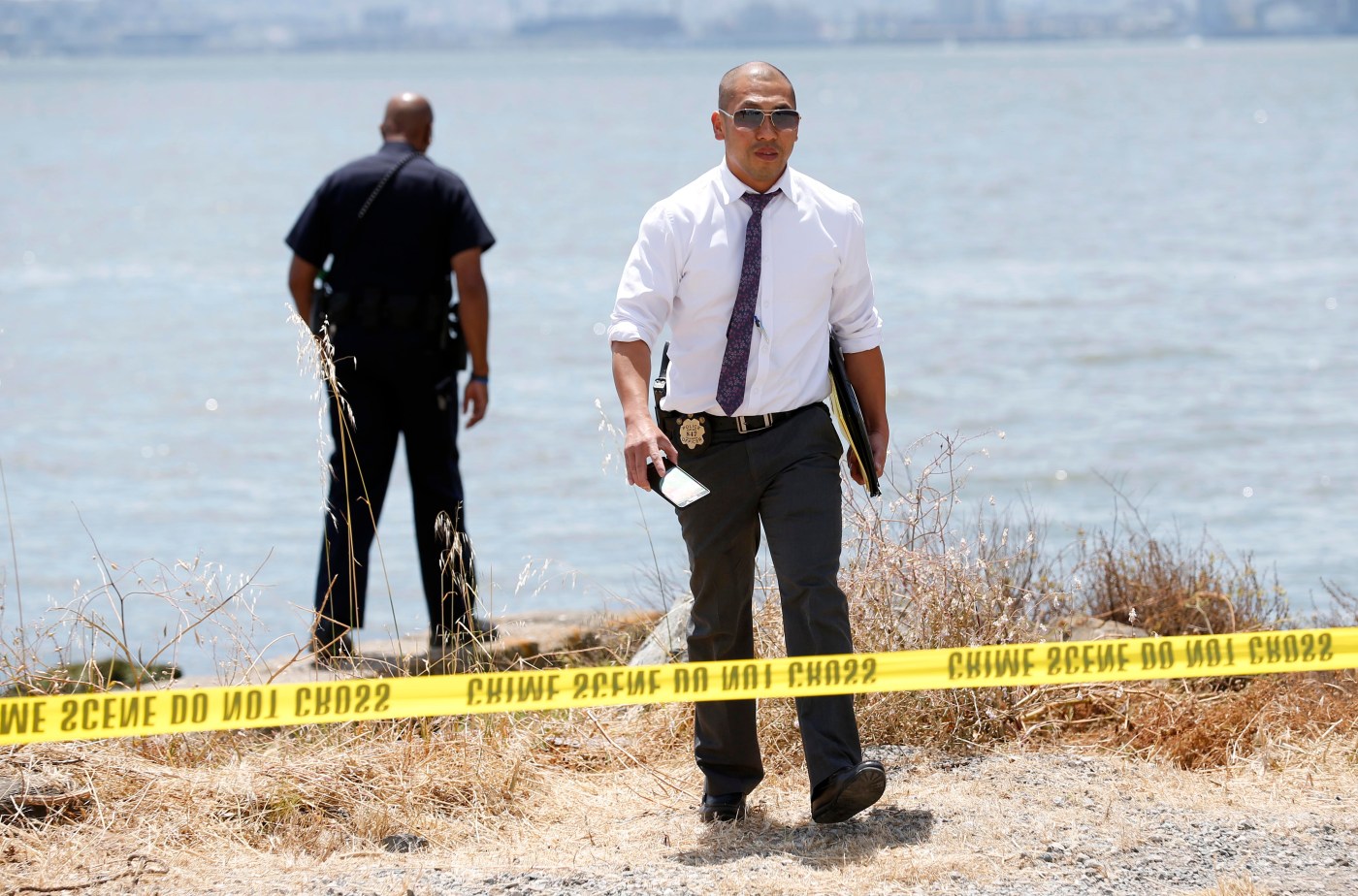
OAKLAND — In a bid to toss their client’s murder conviction, defense attorneys say an Oakland homicide detective showed racial bias by telling him an all-white jury could see him as a “big scary Black guy,” unless he confessed to the killing.
By remaining silent and not admitting to the 2012 shooting, the detective allegedly told the suspect, he “might as well squeeze that noose a little tighter,” according to a recent legal filing by Jenny Brandt and Jane Brown of the Alameda County Public Defender’s Office.
These are the latest allegations against Phong Tran, an Oakland detective known for closing cases in a long career in the homicide unit. His investigations are now under a microscope for his allegedly questionable tactics, which has caused a review of hundreds of homicide cases he either led or touched.
The public defenders allege Tran led an investigation guided by stereotypes of Black men, resulting in the conviction of Steven Buggs, who was initially sentenced to 82 years to life in prison for the September 2012 killing of his close friend, Lester Young. He and his attorneys are now seeking to get the conviction tossed under California’s Racial Justice Act, claiming Tran “engaged in traditional stereotyping from the beginning of the investigation.”
The allegations come amid the ongoing fallout of felony perjury and bribery charges filed in 2023 against Tran, who is accused of paying off and coercing a witness in a separate 2011 murder case. Convictions against two other Black men in that case were later quietly overturned by the Alameda County District Attorney’s Office, after a key witness claimed she received thousands of dollars from Tran to lie on the stand.
Since then, attorneys and judges have overseen multiple lenient plea deals and case dismissals, while local prosecutors reviewed hundreds of active and resolved cases that Tran investigated. More recently, a California appellate court raised deep concerns earlier this year about yet another murder conviction secured with Tran’s testimony.
The future of Tran’s own criminal case has garnered increased attention since the appointment of District Attorney Ursula Jones Dickson, who has worked to unwind the legacy of her recalled predecessor, Pamela Price. Since being appointed to the job in February, Jones Dickson has dismissed multiple cases filed by Price, including indictments against an Oakland metal recycling company and two of its top staffers, while completely overhauling the Public Accountability Unit that first filed charges against Tran in April 2023.
Multiple prior court hearings aimed at setting Tran’s trial date have been delayed in recent months. The detective’s next court date is Sept. 12.
Tran’s attorney did not comment on the filing.
An attorney for Buggs previously raised myriad issues with Tran’s work — suggesting the detective tried to bolster a “weak case” by lying in a search warrant affidavit and relying on interviews that either weren’t recorded, or whose recordings were never preserved.
His attorneys also argue that Tran — who was a homicide detective for a year when investigating Young’s death — originally obtained an arrest warrant for another man, after the only other individual in the room during the killing identified that person as the shooter.
Tran’s focus later shifted to Buggs after the detective received a tip from either an anonymous caller or confidential informant stating Buggs was “having problems” with Young, court records show. Tran also claimed Buggs was a gang member, despite his source for that information claiming at trial that it was untrue, the records said.
The latest court filing seeks to toss the entirety of his conviction, claiming that Tran appeared guided by implicit racial bias. It was readily apparent, the filing said, during Tran’s interrogation of Buggs about a month after Young’s death.
Buggs — after waiting 15 hours at the police station for a recorded interrogation to begin — was told by Tran that “you are a very scary guy when you stand up,” and that a future jury trial could leave his fate “up to some white guy that you’ve never met,” according to excerpts of a transcript from the conversation. The detective referred to those jurors as “the Buttermans” — people who would “sit there in their nice ascots, Polo shirts, their khaki pants and look at you in your red outfit and look at this big ass dude,” who wouldn’t speak to police when given the chance, according to the filing.
“Instead of questioning whether the lack of motive might mean he had the wrong person, Tran relied on racial stereotypes to fabricate a motive,” the filing said. The tropes used by the detective allegedly included, “Black men as misogynistic and Black men as violent drug dealers, who would commit murder over a perceived disrespect,” the filing added.
Buggs’ public defender also suggested that Alameda County prosecutors’ case was tainted by that bias. The DA’s office declined to comment.
The defendant’s attorney cited a law professor at the University of Hawai’i at Mānoa, who was hired to offer his opinion for the filing as an expert in implicit bias. The professor, Justin Levinson, concluded that “the investigation of Mr. Steven Buggs reflected significant influence from implicit racial bias, both in how investigators perceived him and in how they sought to elicit information.”
Alameda County prosecutors have already conceded that parts of what jurors used to find Buggs guilty of murder appear to be plagued with evidentiary problems. In a June court filing, prosecutor Tim Wagstaffe took the unusual step of conceding numerous issues raised by Buggs’ defense team that were central to Buggs’ 2016 conviction.
The motion is scheduled to be discussed at a Sept. 19 court date.
Jakob Rodgers is a senior breaking news reporter. Call, text or send him an encrypted message via Signal at 510-390-2351, or email him at [email protected].